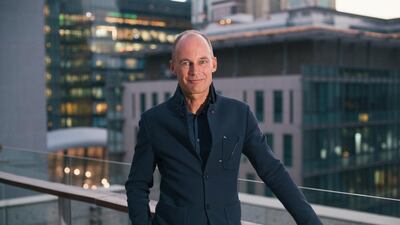ABU DHABI // The capital of the UAE is a symbol of the future, the co-founder of a project to circumnavigate the world in a solar-powered aircraft told an audience on Monday.
“Abu Dhabi is an oil producer that is diversifying to clean energy technologies and I think it is the perfect symbol,” said Bertrand Piccard, who was in the capital after being named the first Middle East Solar Industry Association Ambassador.
Solar Impulse 2, the plane onboard which Dr Piccard and his co-pilot and co-founder, Andre Borschberg, are attempting the world first, took off from Abu Dhabi last March.
Next year, the plan is for the plane to finish its journey where it started.
As the team waits to resume the flight, Dr Piccard commended Abu Dhabi for looking ahead.
“The goal is not to attack what exists. The goal is to support new ways of doing in diversification, and I like this approach.”
His aim, he told the audience, was to continue travelling the world – relying exclusively on solar power. With Solar Impulse 2, his personal goals can be met, and the UAE's solar energy plans can be heard.
“Solar impulse is a project that promotes very strong symbols and this was one that we wanted to promote,” he said.
“The goal is, of course, to go around the world. That is the exciting part, but equally important is the goal of spreading the message of clean technology.”
That dream had to be put on hold until next year, after battery damage resulted in the aircraft being grounded at Hawaii's Kalaeloa airport.
One of the other aims of the flight is to improve the reputation of renewable energy, Dr Piccard said, adding that many people “believe that renewable energies are something boring, expensive and threatening our lifestyle, and we want to show that it is exactly the opposite”.
With Solar Impulse 2, the team wants to show the world what can be achieved using solar energy, things that would otherwise be impossible if attempted using fossil fuels.
Dr Piccard also assured the audience that the delay in the journey was not related to solar energy, but to general wear and tear – overinsulation of the battery being the main issue.
“We know it is an experimental project and we had no benchmark and we made the mistake on the thermal insulation of the batteries, and the result was that the batteries overheated,” he said. “The technology of the battery was perfect. We won the first half. Now, we need to win the second.”
With regards to the fixes being made to the plane, Dr Piccard said Mr Borschberg was in charge. “He is the engineer, I am the explorer and the psychiatrist. This is why we work together because we have a very good synergy. Our project is a vision of the future, where we all produce our own energy and consume it ourselves.”
The mission is expected to resume in April, flying from Hawaii to the west coast of the United States. From there it will fly to New York before crossing the Atlantic Ocean to Europe, and completing its journey in Abu Dhabi, where it started out.
nalwasmi@thenational.ae

